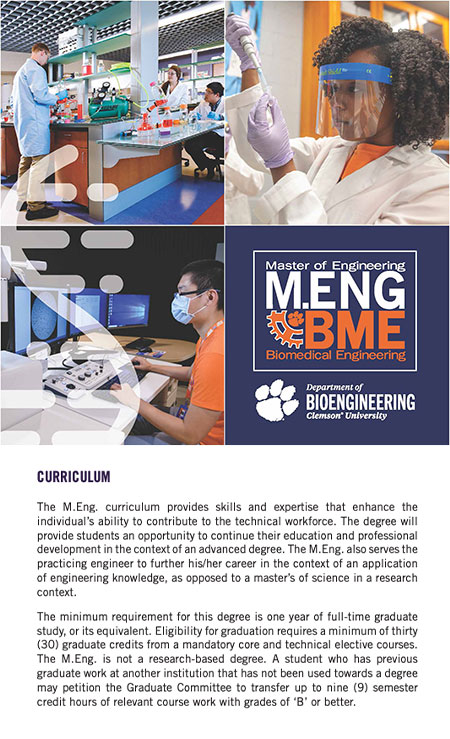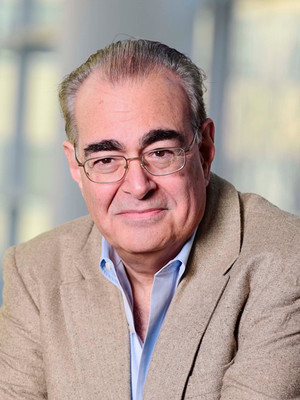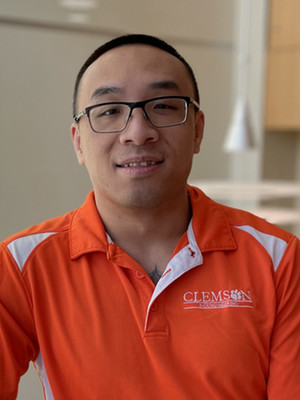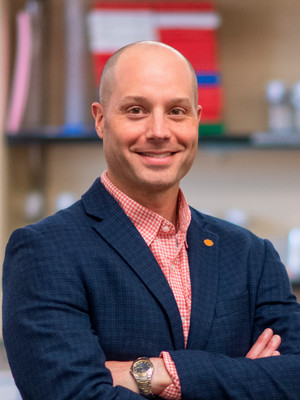
M.Eng. Biomedical Engineering
One-Year M.Eng Degree
Industry Focused - Available Across SC
 Clemson's Masters of Engineering in Biomedical Engineering (BME) is an intensive and encompassing, team-taught curriculum focused on medical device development and commercialization. Students benefit from the first-hand, real-world knowledge of program instructors and mentors who have extensive experience in the medical device industry and entrepreneurship.
Clemson's Masters of Engineering in Biomedical Engineering (BME) is an intensive and encompassing, team-taught curriculum focused on medical device development and commercialization. Students benefit from the first-hand, real-world knowledge of program instructors and mentors who have extensive experience in the medical device industry and entrepreneurship.
Industry Preparedness
- Developing and testing innovative medical devices
- Designing animal and clinical studies
- Drafting business and marketing plans
- Creating regulatory strategies
- Assembling FDA pre-market submissions
85% of our M.ENG. in Biomedical Engineering graduates enter the medical device or associated industries. The remainder go on to professional or doctoral programs.
The BME is a 1-year, non-thesis graduate program designed to prepare students for careers in industry. The Clemson bioengineering department offers this degree program across three campus locations: Clemson, SC; Greenville, SC; and Charleston, SC.
View BME Brochure-
Degree Requirements
It is the responsibility of the student to be aware of and complete all BIOE Department and Graduate School requirements for the M.Eng degree. Students graduating should refer to the deadlines listed on the Graduate School website.
Masters Degree
The Biomedical Engineering program focuses on industry best practices, covering topics that span the entire medical device product lifecycle from design conceptualization to post-market activities. This non-thesis program requires 30 graduate coursework and is designed to prepare students for careers in industry. The M.Eng can be completed within 12 months. The curriculum is made up of five core courses and graduate-level elective courses that help students in their graduate studies and professional careers.
Core Courses
- BioE8140: Medical Device Commercialization (3 Credits)
- BioE8600: Biomedical engineering device design innovation (3 Credits)
- BioE8610/8611: Biomedical engineering product translation (3 Credits)
- BioE8620: Pre-clinical assessment and regulatory affairs for medical devices (3 credits)
- BioE8630: Clinical affairs for medical devices (3 Credits)
Electives
An internship is recommended but not required: Industrial or clinical internship: 1-6 credits (45 hours = 1 credit)
Forms | Graduate School
Quality Science Certificate coursework
GreenMD Certificate coursework
Technology Entrepreneurship Certificate coursework -
Applying to the M.S. Program
The GRE is not required for graduate applications. Please note that you may include unofficial or official GRE scores in your application file if you believe it will strengthen your application. Please note that your chances for admissions or assistantships will not be impacted by not including GRE scores.
- Accredited Engineering or Applied Science Degree (Candidates with other educational and professional backgrounds will be considered on an individual basis.)
- GPA: ≥ 3.0
- TOEFL: ≥ 100 (required for international students)
Required Documents
- Online Application
- Unofficial Transcripts - Official Transcripts required upon acceptance. Do not send official transcripts until you have received your letter of acceptance.
- Letters of Recommendation
Program Contact
Lawrence Boyd, Ph.D.
M.Eng. Program Director
Professor of Practice
864-656-0978
lmboyd@clemson.eduHow to Apply
Students interested in applying to the BIOE master's program must be accepted to the Clemson University Graduate School. Application information and forms can be found on the Graduate School website. International students are welcome to apply and must meet Graduate School requirements for TOEFL scores.
Additional information concerning deadlines and program contacts can be found in the Bioengineering Graduate Handbook. Enrollment in the M.Eng program is open to all students with a bachelor’s degree from an accredited undergraduate engineering program.
Apply | Graduate School
Core Teaching Team
 LAWRENCE BOYD
LAWRENCE BOYD
Professor of Practice
lmboyd@clemson.edu
Lawrence Boyd is a Professor of the Practice in Bioengineering at Clemson University. He is President of Palmetto Biomedical Design & Consulting in Columbia, South Carolina (www.palmettobiomedical.com). He is an experienced business leader & entrepreneur, having founded two medical device-focused ventures (OrthoClip LLC and View Medical). He has over three decades of experience leading product development, engineering and business development efforts for medical device companies. He is a prolific inventor, with nearly 70 issued U.S. patents for medical devices and related procedures.
He was most recently the Chief Product Officer for restor3d, a start-up focused on 3-D printing and personalized orthopaedic implants based in Durham, North Carolina. Previously he was Vice President of Product Development for Bioventus, where he led engineering teams in Durham, Memphis and Los Angeles. Dr. Boyd has held product development leadership positions in multiple companies including Spinal Elements, Medtown Ventures, Spinewave, Medtronic, Sofamor Danek and Wright Medical.
Dr. Boyd has a B.S. degree in Mechanical Engineering and M.S. degree in Bioengineering from Clemson University. He holds a Master of Engineering Management degree from Christian Brothers University. Dr. Boyd received his Ph.D. in Biomedical Engineering from Duke University.
 RICHARD DIMONDA
RICHARD DIMONDA
Professor of Practice
rdimond@clemson.edu
Trained in both electrical and biomedical engineering, and an MBA, Richard brings over 40 years of medical device commercialization experience from a variety of public and private medical companies. He has executive management as well as hands-on experience with regulatory, clinical research, reimbursement, product management and marketing. He has helped commercialized products across 14 different fields of medicine and is Founder of two startups.
Having formerly taught within the entrepreneurship MBA program at the Georgia Tech Scheller College of Business, his objective is to systematically teach the Clemson MENG students, thru experiential project-based learning, the equivalent of a “Mini MBA”. This approach will equip the students to develop a business-related acumen that will grow the breadth of their skill set to enter the job market.
 JENNIFER MERCURI
JENNIFER MERCURI
Instructor of Record
jmgordo@clemson.edu
Jennifer Mercuri is the instructor of record for BIOE8620 and 8630 and has more than 15 years of clinical research experience. Jennifer obtained her M.S. in Bioengineering from Clemson University and started her career as a Research Associate in the Research and Development Department at CR Bard (currently BD) before shifting her professional focus to clinical research. She has worked as a Research Coordinator and Research Writer at The Hawkins Foundation, a Clinical Scientist at Stryker Orthobiologics, and is currently a Senior Project Manager at Emergent Clinical Consulting.
In her current role, she is responsible for overseeing clinical research projects for medical device and pharmaceutical companies through all stages of the project development life-cycle.
 HOBEY TAM
HOBEY TAM
Lecturer
htam@clemson.edu
After completing his doctorate at Clemson, Hobey started his own consulting business to provide technology development and management services to start-ups. The goal of this consulting was to save up enough cash to hopefully start his own company. Inadvertently, he was also training himself on how to be a Chief Technology Officer in the process of helping his clients jumpstart their own companies. Seeing people truly believing that society could be better and, more importantly, working everyday towards that belief was the one thing that he could see getting him out of bed every day for the rest of his life.
In 2018, he moved to the Netherlands and co-founded Oro Muscles, a wearable analytics company that uses electromyography (EMG) and movement (IMU) sensors to analyze human movement. Through this experience, he has seen firsthand the process of developing technology in both hardware and software domains as well as coordinating technical development with a go-to-market strategy, business development, scaling operations, CE mark/FDA regulatory clearance processes, and fundraising. He has taken all the lessons he wished he would have had in engineering school and embedded them into immersive courses taught exclusively through the Bioengineering Department's M Eng. program.
 LAURA TAM
LAURA TAM
Lecturer
lemccal@clemson.edu
Dr. Laura Tam’s industry experience ranges from working at a local startup to working abroad at a large company. While completing her Ph.D. with a focus on diabetes and cardiovascular tissue engineering, She discovered her passion for laboratory benchtop work and bioreactors. Tam then worked as an R&D scientist at a startup, Aptus Bioreactors. There she had the great opportunity to work with and learn from a small team of experts as they made bespoke tissue engineering bioreactors for industry and university research. Dr. Tam wore many hats and mainly worked hands-on building and testing these bioreactors.
Dr. Tam then worked in the pharmaceutical industry at Thermo Fisher Scientific. At this cGMP biologic manufacturing site in the Netherlands, she had the unparalleled experience of working with a diverse international team in upstream processing (USP) and working as a lead operator on the manufacturing floor. Here, she also wore many hats and learned from a large team of subject matter experts in the field, especially those from quality. Beyond manufacturing products for clients, Tam served as the training coordinator for the USP department, conducted deviation investigations, implemented CAPAs, trained and coached new technicians, troubleshot equipment and processes, and aided in writing and revising production protocols, SOPs and reports. At this site, Tam was able to experience manufacturing and supporting batches as they went through the FDA approval process (preclinical testing to clinical trials to PPQ batches to commercial) and site audits. She is excited to bring her specific industry experiences and knowledge to students wanting to work in industry.
 JEREMY MERCURI
JEREMY MERCURI
Professor of Practice
jmercur@clemson.edu
Jeremy Mercuri, PhD has spent the last 20 years of his industry and academic career developing biomimetic and tissue-based biomaterials for orthopaedic and general surgery applications. He started his industry career at Medtronic Spine & Biologics and at Stryker Orthobiologics in research and product development. In these roles he developed a variety of biomaterials and oversaw pre-clinical studies. Subsequently, Jeremy began an academic career at Clemson University in the Department of Bioengineering. As a tenured, endowed associate professor of bioengineering, he directed the Laboratory of Orthopedic Tissue Regeneration & Orthobiologics. His lab’s research focused on developing biomimetic, extracellular matrix-derived biomaterials for intervertebral disc, osteochondral and point-of-care approaches to rotator cuff repair. His lab also studied the efficacy of multiple human stem cell sources to treat a variety of musculoskeletal conditions (i.e. osteoarthritis, intervertebral disc degeneration, skeletal muscle injury) using in vitro and in vivo models.
In 2022, Jeremy co-founded NovaVia Spine & Biologics, LLC (est. 2022) based on the multi-laminate, ply-angle Bio-Patch developed and studied in his lab.
In addition to his role in NovaVia, Jeremy is also currently Chief Scientific Officer of Samaritan Biologics, LLC. At Samaritan, Jeremy manages an applied research portfolio, develops tissue-based / allograft products, oversees clinical trials and supports sales and marketing activities. Jeremy has 45+ senior / first author peer-reviewed publications, 85+ peer-reviewed scientific abstracts, 20+ invited seminars a well as multiple issued patents.

